January 2024 FloridAgriculture eNewsletter
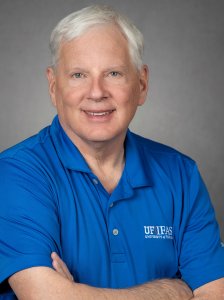 By J. Scott Angle
By J. Scott Angle
[email protected]
@IFAS_VP
You know yourselves as food producers and as stewards of the land. You also know that not everyone sees you that way.
The question isn’t whether they’re right or wrong, whether they disregard their three meals a day while they focus on side effects of it getting to them. The question is how do you talk to people who have seemingly diametrically opposed views of agriculture to your own?
The Florida Farm Bureau Federation has been a great supporter of a part of UF/IFAS that prepares leaders to address this question.
For many years, FFBF has sponsored Fellows participating in the UF/IFAS Natural Resources Leadership Institute, or NRLI, so Florida agriculture can better engage with non-agricultural stakeholders and not just retreat to our own camps when contentious issues arise.
NRLI doesn’t teach people how to produce food. It does teach farmers and leaders how to communicate with people who see agriculture as a threat.
That’s been invaluable to Andrew Walmsley, a NRLI alumnus whose day-to-day job as your legislative affairs director involves communicating with policy makers who don’t understand agriculture and sometimes don’t appreciate it.
In fact, said Walmsley, NRLI helped him hone the skills to talk across the divide to organizations like the Environmental Defense Fund as he helped the American Farm Bureau Federation launch the Food and Agriculture Climate Alliance.
Instead of regarding EDF as an adversary, Walmsley adopted the NRLI approach to working with it as a stakeholder with a common interest. It has resulted in mutual support for policy recommendations for the Farm Bill to help agriculture achieve its climate mitigation potential while preserving and creating economic opportunity.
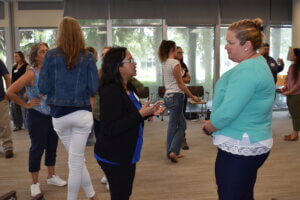 FFBF leadership programs coordinator Michele Curts is a member of the current NRLI class. She finds it remarkable that beyond building valuable skills such as facilitation of difficult conversations, NRLI brings together people who normally would never cross paths and do not find themselves on the same side of all issues.
FFBF leadership programs coordinator Michele Curts is a member of the current NRLI class. She finds it remarkable that beyond building valuable skills such as facilitation of difficult conversations, NRLI brings together people who normally would never cross paths and do not find themselves on the same side of all issues.
Charles Shinn, your retired director for government and community affairs, is a NRLI alumnus who credits it with helping him form relationships with classmates from government, industry and activist groups, a network that he still relies on years after his participation in the program.
Farm Bureau has also subsidized the participation of volunteer leaders such as Ben Butler, Clay Archey and John Dooner.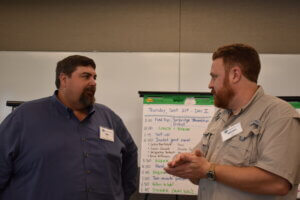
It’s time for applications. If you’re ready to step up and invest in yourself as a leader, please consider NRLI. Contact your field rep or county chapter president or reach out directly to FFBF professionals who can support your application and help you through the process of securing a nomination.
NRLI requires a three-day stretch each month for most of an academic year. It was an especially big commitment for Walmsley, whose first child was born during his time in NRLI.
He said it was worth it. He’s better for it, and as a result so is Florida agriculture.
J. Scott Angle is the University of Florida’s Interim Provost. Since 2020 he has served as UF’s Senior Vice President for Agriculture and Natural Resources and leader of the UF Institute of Food and Agricultural Sciences (UF/IFAS).

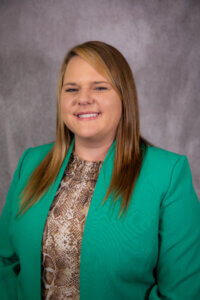
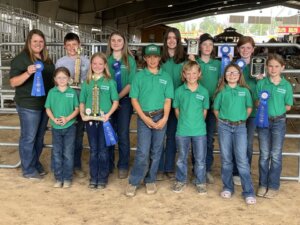
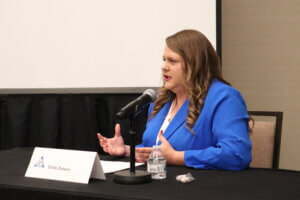
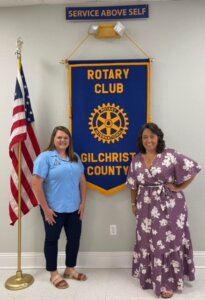 Jones believes in the future of the young people in her community and is continuously looking for ways to engage them in agriculture. In addition to her involvement with the younger generation, Jones is always looking for ways to push herself professionally. She participated in the Young Farmers & Ranchers Discussion Meet at the organization’s annual meeting and will be representing Florida at the 2024 American Farm Bureau Convention in Salt Lake City, Utah in January.
Jones believes in the future of the young people in her community and is continuously looking for ways to engage them in agriculture. In addition to her involvement with the younger generation, Jones is always looking for ways to push herself professionally. She participated in the Young Farmers & Ranchers Discussion Meet at the organization’s annual meeting and will be representing Florida at the 2024 American Farm Bureau Convention in Salt Lake City, Utah in January.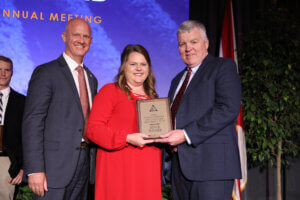
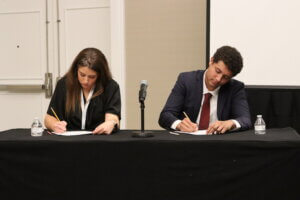 Heijkoop’s road to Orlando, where she competed in the Collegiate Discussion Meet, was guided by two important mentors—Staci Sims at FFBF and Dr. Charlotte Emerson at CALS.
Heijkoop’s road to Orlando, where she competed in the Collegiate Discussion Meet, was guided by two important mentors—Staci Sims at FFBF and Dr. Charlotte Emerson at CALS.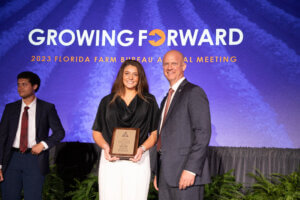 Heijkoop won the state Collegiate Discussion Meet. FFBF and UF/IFAS will support her in her journey next year to compete at the national level in the American Farm Bureau Federation Collegiate Discussion Meet. FFBF supports students through th
Heijkoop won the state Collegiate Discussion Meet. FFBF and UF/IFAS will support her in her journey next year to compete at the national level in the American Farm Bureau Federation Collegiate Discussion Meet. FFBF supports students through th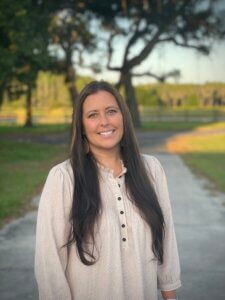 A Florida native, Ellie John was raised in the town of Duette, located in Manatee County. She was part of the Mighty 4-Hers of Duette and raised pigs during her youth. Growing up, John spent many summers on her great-grandparents’ farm and cousins’ dairy farm, both in New Jersey.
A Florida native, Ellie John was raised in the town of Duette, located in Manatee County. She was part of the Mighty 4-Hers of Duette and raised pigs during her youth. Growing up, John spent many summers on her great-grandparents’ farm and cousins’ dairy farm, both in New Jersey. 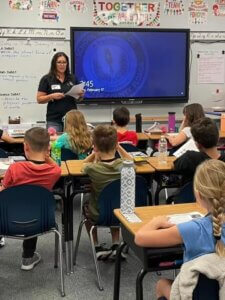
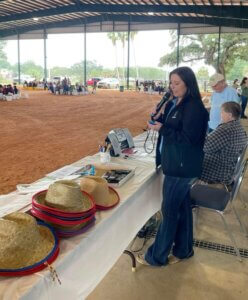 She is also involved with the Manatee County beef workshop and prospect show which also takes place during Farm-City Week.
She is also involved with the Manatee County beef workshop and prospect show which also takes place during Farm-City Week.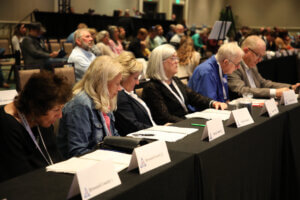 In the 2023 policy process, 23 policies were amended, one policy was removed, and eight new resolutions were accepted. These changes represent the current needs of agricultural producers in Florida and will give FFBF staff the direction they need to advocate for farmers and ranchers at the local, state, and national level.
In the 2023 policy process, 23 policies were amended, one policy was removed, and eight new resolutions were accepted. These changes represent the current needs of agricultural producers in Florida and will give FFBF staff the direction they need to advocate for farmers and ranchers at the local, state, and national level.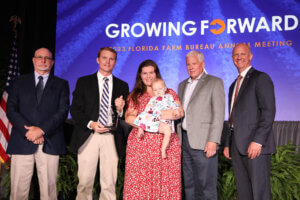 David was cherished as a man as well as a scientist, so it’s very meaningful to us at
David was cherished as a man as well as a scientist, so it’s very meaningful to us at Join your fellow Ag professionals and enthusiasts and attend the 2024 American Farm Bureau Federation’s Annual Convention in Salt Lake City, Utah, January 19-24, 2024. Farm Bureau members and non-members alike are welcome to be a part of our nation’s largest general Ag organization. At this celebration you will hear motivational keynote speakers, be able to cheer on our state award competitors, and interact with exhibitors while learning about their products on the trade show floor. Networking with fellow Ag leaders and attending educational sessions is also an important part of the AFBF Convention. Salt Lake City Farm Tours are on Saturday, January 20 and Tuesday, January 23 and are listed on the registration form.
Join your fellow Ag professionals and enthusiasts and attend the 2024 American Farm Bureau Federation’s Annual Convention in Salt Lake City, Utah, January 19-24, 2024. Farm Bureau members and non-members alike are welcome to be a part of our nation’s largest general Ag organization. At this celebration you will hear motivational keynote speakers, be able to cheer on our state award competitors, and interact with exhibitors while learning about their products on the trade show floor. Networking with fellow Ag leaders and attending educational sessions is also an important part of the AFBF Convention. Salt Lake City Farm Tours are on Saturday, January 20 and Tuesday, January 23 and are listed on the registration form.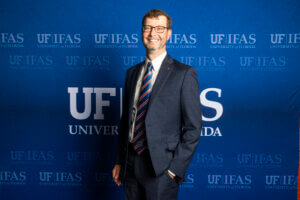
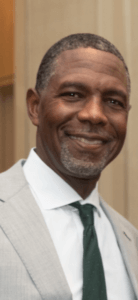 Howard’s parents were active Farm Bureau members, serving in various roles in the community and on the county board. Howard has been actively involved with the Collier County Farm Bureau for five years and now serves as the Collier County president. He has enjoyed watching young people in his community show interest in agriculture and partake in various programs, like the Young Farmers & Ranchers.
Howard’s parents were active Farm Bureau members, serving in various roles in the community and on the county board. Howard has been actively involved with the Collier County Farm Bureau for five years and now serves as the Collier County president. He has enjoyed watching young people in his community show interest in agriculture and partake in various programs, like the Young Farmers & Ranchers.